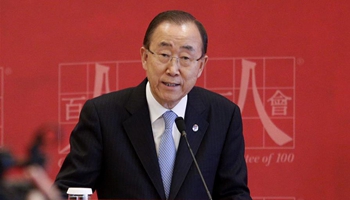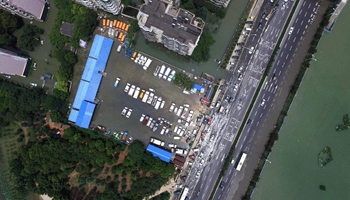BEIJING, July 9 (Xinhua) -- The South China Sea arbitration initiated by the Philippines and without China's consent is a political farce.
The reason is simple: the United States is using the administration of former Philippine President Benigno S. Aquino III to raise tensions in the region.
The United States is using the Philippines as a tool and applying an outdated Cold War mentality to contain China in a bid to maintain its own dominance in the region.
As an outsider country and a non-claimant in the maritime and territorial disputes in the South China Sea, the super power's Cold War thinking is perfectly embodied in its Rebalance to Asia strategy and military maneuvers.
First, the country is calling white black and fabricating something from nothing. The United States calls China's lawful construction activities on its own sovereign territory a threat to the region, and even the entire globe. It does so by using the press to portray China as a threat to "navigational freedom" in a bid to smear China, which has never threatened freedom of navigation and depends on the safe passage of goods in the South China Sea for its own development.
Second, the United States is calling on China to abide by the United Nations Convention on the Law of the Sea , but refuses to join the convention itself.
Third, the United States directly gains from muddying waters in South China Sea. Since the Obama administration proposed its Rebalance to Asia strategy in 2009, the situation in the South China Sea has become unnecessarily tense. This tension is being used to form alliances with countries in the region against China.
The U.S. army continues to send warships into waters adjacent to China's Nansha Islands and B-52 bombers flying into China's territorial space under the guise of freedom of navigation. Meanwhile, U.S. defence and army leaders continue to deliver hawkish speeches.
Washington also carried the Cold-War mentality beyond the South China Sea and Asia-Pacific region.
In Europe, U.S.-led NATO has been seeking an eastward expansion to squeeze Russia. Its actions have altered established geopolitical structures and triggered the Ukraine crisis.
In essence, the United States wants to remain the sole super power in the world by railroading through the Cold-War mentality, even at the price of sacrificing other states' national security, which explained why Washington was behind the chaos and violence in quite a few countries.
However, at a time of globalization of high interdependence, no country can achieve absolute security single-handedly, especially when intentionally raising tensions and holding up to the mindset of confrontation and containment, no matter how super it is. Washington should reflect on its practice to avoid being penny wise, pound foolish.
Related:
Interview: South China Sea arbitration likely to stir more regional tensions: Italian expert
by Alessandra Cardone
ROME, July 8 (Xinhua) -- The forthcoming arbitration on the South China Sea dispute by the Permanent Court of Arbitration in The Hague is likely to stir more tensions in the region, said an Italian expert.
"I reckon the judgement of the court will not help the dialogue between the two parties involved, China and the Philippines, but rather worsen the crisis," Domenico Losurdo, a famous Italian historical philosopher and professor at the University of Urbino, told Xinhua in a recent interview. Full story










